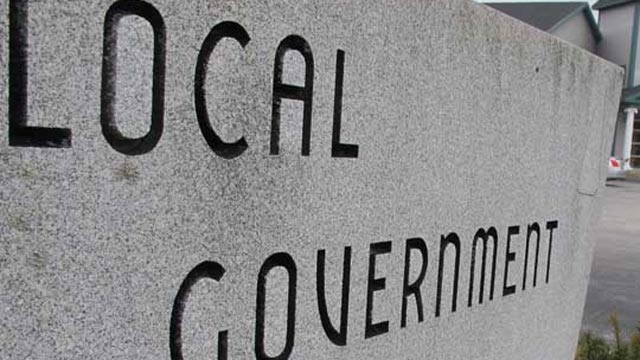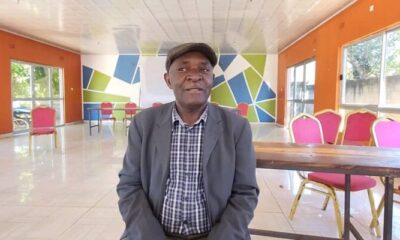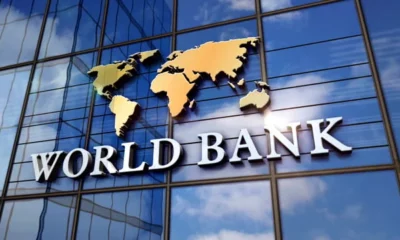Strictly Personal
In whose interest do governors hold LG funds? By Niran Adedokun
Published
8 months agoon

“Two recent events in Nigeria demonstrate state governors’ overlordship and self-absorbed nature. And with what we saw in Edo and Ogun states, it is also clear that the totalitarian tendencies of governors transcend party affiliations.
The governor of Edo State, Godwin Obaseki, momentarily turned his deputy, Philip Shaibu, into a destitute, even though they were elected on the same ticket. Obaseki won elections on the platform of the Peoples Democratic Party. His Ogun State counterpart, Dapo Abiodun, who sat like an emperor while people’s fathers prostrated before him for their subsistence, is of the All Progressives Congress. The men of authority in Nigeria are united in their misuse of power and state resources, even against the people’s interest.
In Edo State, the first two citizens fell out because the deputy governor reportedly aspired for the party’s governorship ticket. Like most governors, Obaseki seemed to have other plans, so all hell broke loose.
Before the intervention of some respected citizens of the state this week, Shaibu had filed a court action against the state House of Assembly, which allegedly had the governor’s push to impeach him. That audacity infuriated Obaseki, so he went all out against his deputy without any care about the optics.
His security detail at a recent state function stopped the deputy governor from speaking with his boss! Obaseki’s aides later came up with the ridiculous excuse that their principal was oblivious to his deputy’s move, even though pictures from the event showed the proximity between the parties.
Not just that. Obaseki ordered the withdrawal of his deputy’s press crew and directed that the latter must, subsequently, write to request coverage from the governor’s office. You can only imagine the humiliation awaiting Shaibu in the event of such requests. That is not to speak of other actions targeted at diminishing his influence and rubbishing his office, but for external intervention that led to the withdrawal of the court case.
So, what are the issues here? They are the desperate scramble for power, the unbridled deployment of state resources against political opponents, and the total disregard for the welfare of the people while this is going on.
The situation in Ogun State is more explicit. Chairman of the Ijebu East Local Government of the state, Wale Adedayo, had accused the governor of withholding funds belonging to the local government for the second year running.
In addition to sending petitions to the Economic and Financial Crimes Commission and the Independent Corrupt Practices and other Related Offences Commission, Adedayo also sought the intervention of a former governor of the state and party elder, Chief Segun Osoba. He indicated that local government chairmen got no allocations since their election in 2021 and attributed the lack of development in the rural areas to the governor’s actions.
On the surface, his petition, which has gone viral, appears altruistic and motivated by nothing else but the welfare and well-being of citizens. For instance, a part of it read: “Revenue sources, which the local governments should benefit from, have mostly been taken over by the state government. Motor Parks and attendant dues, which should go to each local government, are centrally managed by the state government. Primary school administration and control have been taken over, too… In Ijebu East Local Government Area, we are a complete rural section. Our people need roads, especially in the interior. They need water. The health centres are nothing to write home about. The primary schools are something else. It is a crying shame that, in 2023, some of our people still depend on water from the stream to drink!”
This part of the petition presents a grim picture that should worry everyone, especially a governor who swore to improve the people’s condition. Suppose Adedayo’s plea is untrue or presumptuous in any respect; the man accused should show due regard for the electorate, clarify, and then start to address the developmental issues raised in the petition. But that is not the way of the Nigerian governor.
First, considering himself a tin god and justifiably so, the average state governor would rather address issues dissipating energy on crushing anyone who dares confront him. His irritation is more when the “offender” is a member of his party or someone he profiles as a beneficiary of his grace.
Now, this is what almost all elected representatives are to governors. From the wards to the National Assembly, most governors decide who contests for what position, striking out and replacing names without regard to the people’s preference.
From party officials to councillors, local government presiding officers, members of the state House of Assembly, House of Representatives members, and senators (except when the senatorial candidate is an outgoing governor), state governors decide who gets what and enforce the same without mercy or consideration for any other factor.
Although they deploy state resources for the execution of this venture, their main aim is self-preservation. This is how state governors got members of state Houses of Assembly to reject their autonomy for so many years! The role that governors play in appointing judges in their states is also why many Nigerians cannot be sure of getting justice against the state government. The absolute tendency of governors is unending.
Adedayo colleagues’ decision to beg the governor stemmed from this realisation. Although he claims that all chairmen agreed to write the petition, his colleagues preferred throwing him under the bus, siding with the governor to protect their offices and livelihood. Politics and political offices are like business for many people, so they would sacrifice the general good for survival.
The fate awaiting them otherwise is evident in Adedayo’s travails in the last few days. First was the attempt to impeach him by members of his legislative council. Ultimately, he was suspended for six months based on accusations of maladministration and financial mismanagement. We do not know whether there is any substance in these accusations but why did the legislators wait until the current crisis ensued before bringing up the charges?
It is also noteworthy that governors take all their arsenal to war when matters get to this head. As a state correspondent for The PUNCH years back, a state governor went as far as instigating armed robbery and gun-running charges against a council chairman just to remove him from office. The extent to which these people go is confounding.
So, at junctures like this, it should not surprise you that policemen and “political thugs” will collaborate to achieve one purpose. Hence, reading about a similar scenario in the matter under discussion was not surprising.
However, it is worrisome that state institutions would lend themselves to the oppression of ordinary Nigerians in these circumstances.
Reports indicate that the Department of State Services detained Adedayo for three days. His detention was reportedly based on allegations of defamation and planning a protest by the governor. One wonders why the chairman was not released immediately after his interrogation. Why deny him his freedom for three days? But it isn’t out of the character of many state agencies whose loyalty is with the government of the day instead of the country and its people!
Avoiding the consequences (which are still ongoing) that Adedayo faced is the reason local government chairmen across the country (most of whom have the same fate) are too frightened to complain about their governors. After all, most of them aspired for the office for what they could gain; why should they jeopardise that by confronting the conquering lion that their governor is? But will Nigeria ever attain sustainable development without paying attention to local governments?
There is a temptation to attribute the problems that local government administrators face to the creation of the State Joint Local Government Account by S.162 (6) of the 1999 Constitution, and there may be a point there. But wouldn’t things be better if governors had more fidelity to their oaths? Wouldn’t Nigeria be better if everyone elected to public office were more committed to the people’s welfare and a legacy of achievement?
You may like
-


Nigeria loses N1.29trn annually to crude oil theft, vandalism— Reps Speaker
-


All my tough policy decisions are in Nigerians’ interest— Tinubu
-


Nigerian oil regulator implements regional fuel standards
-


Nigeria’s NGX Group enters into strategic investment partnership with Ethiopian Securities Exchange
-


Nigeria: 118 prison inmates escape after rainstorm destroys facility
-


Nigeria’s antigraft agency EFCC may try 300 forex racketeers
Strictly Personal
Air Peace, capitalism and national interest, By Dakuku Peterside
Published
2 weeks agoon
April 16, 2024
Nigerian corporate influence and that of the West continue to collide. The rationale is straightforward: whereas corporate activity in Europe and America is part of their larger local and foreign policy engagement, privately owned enterprises in Nigeria or commercial interests are not part of Nigeria’s foreign policy ecosystem, neither is there a strong culture of government support for privately owned enterprises’ expansion locally and internationally.
The relationship between Nigerian businesses and foreign policy is important to the national interest. When backing domestic Nigerian companies to compete on a worldwide scale, the government should see it as a lever to drive foreign policy, and national strategic interest, promote trade, enhance national security considerations, and minimize distortion in the domestic market as the foreign airlines were doing, boost GDP, create employment opportunities, and optimize corporate returns for the firms.
Admitted nations do not always interfere directly in their companies’ business and commercial dealings, and there are always exceptions. I can cite two areas of exception: military sales by companies because of their strategic implications and are, therefore, part of foreign and diplomatic policy and processes. The second is where the products or routes of a company have implications for foreign policy. Air Peace falls into the second category in the Lagos – London route.
Two events demonstrate an emerging trend that, if not checked, will disincentivize Nigerian firms from competing in the global marketplace. There are other notable examples, but I am using these two examples because they are very recent and ongoing, and they are typological representations of the need for Nigerian government backing and support for local companies that are playing in a very competitive international market dominated by big foreign companies whose governments are using all forms of foreign policies and diplomacy to support and sustain.
The first is Air Peace. It is the only Nigerian-owned aviation company playing globally and checkmating the dominance of foreign airlines. The most recent advance is the commencement of flights on the Lagos – London route. In Nigeria, foreign airlines are well-established and accustomed to a lack of rivalry, yet a free-market economy depends on the existence of competition. Nigeria has significantly larger airline profits per passenger than other comparable African nations. Insufficient competition has resulted in high ticket costs and poor service quality. It is precisely this jinx that Air Peace is attempting to break.
On March 30, 2024, Air Peace reciprocated the lopsided Bilateral Air Service Agreement, BASA, between Nigeria and the United Kingdom when the local airline began direct flight operations from Lagos to Gatwick Airport in London. This elicited several reactions from foreign airlines backed by their various sovereigns because of their strategic interest. A critical response is the commencement of a price war. Before the Air Peace entry, the price of international flight tickets on the Lagos-London route had soared to as much as N3.5 million for the economy ticket. However, after Air Peace introduced a return economy class ticket priced at N1.2 million, foreign carriers like British Airways, Virgin Atlantic, and Qatar Airways reduced their fares significantly to remain competitive.
In a price war, there is little the government can do. In an open-market competitive situation such as this, our government must not act in a manner that suggests it is antagonistic to foreign players and competitors. There must be an appearance of a level playing field. However, government owes Air Peace protection against foreign competitors backed by their home governments. This is in the overall interest of the Nigerian consumer of goods and services. Competition history in the airspace works where the Consumer Protection Authority in the host country is active. This is almost absent in Nigeria and it is a reason why foreign airlines have been arbitrary in pricing their tickets. Nigerian consumers are often at the mercy of these foreign firms who lack any vista of patriotism and are more inclined to protect the national interest of their governments and countries.
It would not be too much to expect Nigerian companies playing globally to benefit from the protection of the Nigerian government to limit influence peddling by foreign-owned companies. The success of Air Peace should enable a more competitive and sustainable market, allowing domestic players to grow their network and propel Nigeria to the forefront of international aviation.
The second is Proforce, a Nigerian-owned military hardware manufacturing firm active in Rwanda, Chad, Mali, Ghana, Niger, Burkina Faso, and South Sudan. Despite the growing capacity of Proforce in military hardware manufacturing, Nigeria entered two lopsided arrangements with two UAE firms to supply military equipment worth billions of dollars , respectively. Both deals are backed by the UAE government but executed by UAE firms.
These deals on a more extensive web are not unconnected with UAE’s national strategic interest. In pursuit of its strategic national interest, India is pushing Indian firms to supply military equipment to Nigeria. The Nigerian defence equipment market has seen weaker indigenous competitors driven out due to the combination of local manufacturers’ lack of competitive capacity and government patronage of Asian, European, and US firms in the defence equipment manufacturing sector. This is a misnomer and needs to be corrected.
Not only should our government be the primary customer of this firm if its products meet international standards, but it should also support and protect it from the harsh competitive realities of a challenging but strategic market directly linked to our national military procurement ecosystem. The ability to produce military hardware locally is significant to our defence strategy.
This firm and similar companies playing in this strategic defence area must be considered strategic and have a considerable place in Nigeria’s foreign policy calculations. Protecting Nigeria’s interests is the primary reason for our engagement in global diplomacy. The government must deliberately balance national interest with capacity and competence in military hardware purchases. It will not be too much to ask these foreign firms to partner with local companies so we can embed the technology transfer advantages.
Our government must create an environment that enables our local companies to compete globally and ply their trades in various countries. It should be part of the government’s overall economic, strategic growth agenda to identify areas or sectors in which Nigerian companies have a competitive advantage, especially in the sub-region and across Africa and support the companies in these sectors to advance and grow to dominate in the African region with a view to competing globally. Government support in the form of incentives such as competitive grants ,tax credit for consumers ,low-interest capital, patronage, G2G business, operational support, and diplomatic lobbying, amongst others, will alter the competitive landscape. Governments and key government agencies in the west retain the services of lobbying firms in pursuit of its strategic interest.
Nigerian firms’ competitiveness on a global scale can only be enhanced by the support of the Nigerian government. Foreign policy interests should be a key driver of Nigerian trade agreements. How does the Nigerian government support private companies to grow and compete globally? Is it intentionally mapping out growth areas and creating opportunities for Nigerian firms to maximize their potential? Is the government at the domestic level removing bottlenecks and impediments to private company growth, allowing a level playing field for these companies to compete with international companies?
Why is the government patronising foreign firms against local firms if their products are of similar value? Why are Nigerian consumers left to the hands of international companies in some sectors without the government actively supporting the growth of local firms to compete in those sectors? These questions merit honest answers. Nigerian national interest must be the driving factor for our foreign policies, which must cover the private sector, just as is the case with most developed countries. The new global capitalism is not a product of accident or chance; the government has choreographed and shaped it by using foreign policies to support and protect local firms competing globally. Nigeria must learn to do the same to build a strong economy with more jobs.
Strictly Personal
This is chaos, not governance, and we must stop it, By Tee Ngugi
Published
2 weeks agoon
April 10, 2024
The following are stories that have dominated mainstream media in recent times. Fake fertiliser and attempts by powerful politicians to kill the story. A nation of bribes, government ministries and corporations where the vice is so routine that it has the semblance of policy. Irregular spending of billions in Nairobi County.
Billions are spent in all countries on domestic and foreign travel. Grabbing of land belonging to state corporations, was a scam reminiscent of the Kanu era when even public toilets would be grabbed. Crisis in the health and education sectors.
Tribalism in hiring for state jobs. Return of construction in riparian lands and natural waterways. Relocation of major businesses because of high cost of power and heavy taxation. A tax regime that is so punitive, it squeezes life out of small businesses. Etc, ad nauseam.
To be fair, these stories of thievery, mismanagement, negligence, incompetence and greed have been present in all administrations since independence.
However, instead of the cynically-named “mama mboga” government reversing this gradual slide towards state failure, it is fuelling it.
Alternately, it’s campaigning for 2027 or gallivanting all over the world, evoking the legend of Emperor Nero playing the violin as Rome burned.
A government is run based on strict adherence to policies and laws. It appoints the most competent personnel, irrespective of tribe, to run efficient departments which have clear-cut goals.
It aligns education to its national vision. Its strategies to achieve food security should be driven by the best brains and guided by innovative policies. It enacts policies that attract investment and incentivize building of businesses. It treats any kind of thievery or negligence as sabotage.
Government is not a political party. Government officials should have nothing to do with political party matters. They should be so engaged in their government duties that they literally would not have time for party issues. Government jobs should not be used to reward girlfriends and cronies.
Government is exhausting work undertaken because of a passion to transform lives, not for the trappings of power. Government is not endless campaigning to win the next election. To his credit, Mwai Kibaki left party matters alone until he had to run for re-election.
We have corrupted the meaning of government. We have parliamentarians beholden to their tribes, not to ideas.
We have incompetent and corrupt judges. We have a civil service where you bribe to be served. Police take bribes to allow death traps on our roads. We have urban planners who plan nothing except how to line their pockets. We have regulatory agencies that regulate nothing, including the intake of their fat stomachs.
We have advisers who advise on which tenders should go to whom. There is no central organising ethos at the heart of government. There is no sense of national purpose. We have flurries of national activities, policies, legislation, appointments which don’t lead to meaningful growth. We just run on the same spot.
Tee Ngugi is a Nairobi-based political commentator
EDITOR’S PICK


Al Ahly, Esperance to clash in CAF Champions League final
Two of Africa’s club giants, Egypt’s Al Ahly and Esperance of Tunisia, will do battle next month over two legs...


Collabo with Burna Boy enabled me buy house for my mum— Mozambican DJ Tarico
Mozambican disc jockey and sound-producer, DJ Tarico, has credited Nigeria’s Afrobeats sensation, Burna Boy, with his sudden wealth which enabled...


RepAir, Cella partner to launch carbon capture in Kenya
Global Direct Air Capture (DAC) firm, RepAir, has entered into a partnership with carbon storage technology company, Cella, to launch...


Mapanza traditional council shares positive outlook on media rights, freedom of expression
Jonathan Muchindu, a representative of the Traditional Council of Mapanza Chiefdom in Choma District, Southern Province, Zambia, asserts that the...


World Bank grants Malawi $57.6 million for food crisis
As a response to its food crisis, the World Bank said on Friday that it would give Malawi $57.6 million...


Nigeria loses N1.29trn annually to crude oil theft, vandalism— Reps Speaker
Speaker of Nigeria’s House of Representatives, Hon. Abbas Tajudeen, has revealed that the country loses a whopping sum of N1.29...


Intel Liftoff Hackathon 2024 calls for applications from African AI startups
Applications for the 2024 cohort of Intel Liftoff Hackathon has opened for African AI startups designed to bring together aspiring...


African men run away from single mothers— Joselyn Dumas
Veteran Ghanaian actress and media personality, Joselyn Dumas, has lamented the fact that most African men shy away from getting...


Former Zambian captain Rainford Kalaba discharged from hospital after near-fatal accident
Former Zambian national team captain, Rainford Kalaba, has been discharged from hospital weeks after he was involved in a near-fatal...


‘Cyber Act fails to protect the vulnerable,’ Student demands media inclusivity for persons with disabilities
Peter Libila, a student at Icof University’s Chipata campus, highlights the lack of awareness among individuals with disabilities and those...
Trending
-

 Metro1 day ago
Metro1 day ago‘Cyber Act fails to protect the vulnerable,’ Student demands media inclusivity for persons with disabilities
-

 Sports1 day ago
Sports1 day agoFormer Zambian captain Rainford Kalaba discharged from hospital after near-fatal accident
-

 Tech1 day ago
Tech1 day agoIntel Liftoff Hackathon 2024 calls for applications from African AI startups
-

 Metro2 days ago
Metro2 days agoNigeria govt cancels 924 dormant mining licences


